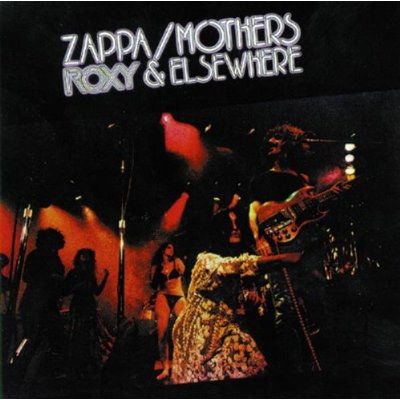4. Frank Zappa & The MothersRoxy & Elsewhere

It’s probably right to move on next in a timely fashion to Frank Zappa, because Beefheart and Zappa are sort of linked for me, because I was introduced to Frank Zappa when I got back from that house party and said to my friend “I heard this thing, it’s called Captain Beefheart, it’s really great.” He said “We should listen to this.” And he put on a guitar solo that lasted for 10 minutes and I was like “Christ who’s this?!” and he said it was Frank Zappa. So I went to a local record shop and bought a compilation called Cheap Thrills, which is not what I’m choosing, and I put it on and I just was like “What on Earth is going on?” Some of them are instrumentals, some of them are really filthy, some of them are just these amazing guitar solos, some of them are heavy rock, some of them are funny and the band are pissing themselves on stage.
And so I began, literally, whatever records the shop had I would buy, and I would go back the next week to we’ll see what they’d replaced it with. If they had more than I could afford, I would pick the one with the cover I liked the most. And I began this amazing journey into the strange and difficult and glorious world of Frank Zappa. In his lifetime, I hope I’m not getting this wrong but he had 70 albums.
But I’ve picked Roxy & Elsewhere, which is a live album taken from a band he had in the early 70s. Not only is every album of his different, but the musicians are often different, the live tours were different, so he’d release about two albums a year. And you could go from one to the other and think “How has the same man made this in the same year?” But he did have phases and periods. So this is from his early 70s phase which also would have included stuff like Apostrophe and Overnight Sensation. And picking one Zappa album was kind of made easy by the fact it was so difficult, if you see what I mean? Like, how do you pick one of 70 albums? You just go “Well, here’s an example of a moment in time.” And the songs are very complex, there’s an awful lot percussion, the time signature is very interesting, it’s very funny… But he is someone you’re either obsessed with or you haven’t heard of. I do think he’s kind of ignored by critics because they want to be the people who set the trend for what is cool and what is not, and he so consistently went against that. And I think he was cleverer, and understood the music industry in a more interesting way than music critics. So I think they probably said “Oh, he’s just a cynic”, whereas actually he was sort of doing them at their own game.
For example, with We’re Only In It For The Money, who, when Sgt Pepper came out, would think “I’m going to parody that, and release it within two months”? I mean, it’s insane. When Sgt Pepper came out, which is now a complete sacred cow, he was recording the music for that album and he just went “Well, this is a perfect example of what I’ve been trying to articulate, so I’ll just tear shreds off it.” But also with a slight musical affection, I think. Because he worked with John Lennon, even though they fell out.
But he’s very daunting, and the most common question I get asked is “Where should I start?” And it’s really hard to answer that question. I would just go chronological, or just do it by what album cover you like, or what song title you find the funniest. I mean there’s this instrumental on Roxy & Elsewhere called ‘Don’t You Ever Wash That Thing?’, which is just brilliant. That’s right down my alley.


